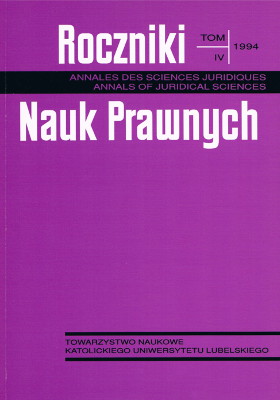Kształtowanie się zawodu pełnomocnika sądowego w Lublinie. Przyczynek do historii palestry lubelskiej (II połowa XV wieku)
Abstrakt
The subject of the present article is formation of the profession of the lawsuit plenipotentiary as well as his work in the Lublin consistorial court. In the 15th century the lawsuit plenipotentiary was usually referred to by the Latin terms of „procurator” or „plenipotens”. A meritorious and outstanding plenipotentiaries had the honorary or professional title „magister causarum”.
In that period employing or establishing lawsuit plenipotentiaries by the clients was officially effected and recorded in the consistorial book. The client usually stated that the reason for establishing the plenipotentiary is to present the case better in the court − „in meliori forma”. In the 15th century there existed a kind of specialization of plenipotentiaries; some of them undertook defense of their clients only in the consistorial court while others only in the common administrator’s courts.
The process in which the profession of plenipotentiary was formed was very slow. It was not then customary or necessary to employ counsel for most cases as usually they were not complicated and concerned only minor conflicts. There were very few criminal cases in the were second half of the 15th century only a few treated appearing in court as their profession and even they did so only until they consistorial court. In the 33 plenipotentiaries who are known in the able to find a more profitable job.
Mikołaj Pniowski, the rector of the Lublin school, Piotr Bełżecki, who was later to become a judge and a priest, as well as Piotr of Opoczno and Stanisław Ochyłka should be included among the most active and most respected consistorial court plenipotentiaries; the latter two were at the same time court notaries.
Only few plenipotentiaries had university education. Most of them had some knowledge of the law which they acquired at the Latin schools which taught rhetoric and the „civil style”. The most important way of acquiring the knowledge of conducting defense in court was practice consisting in participation in trials in which experienced plenipotentiaries appeared.
Copyright (c) 1994 Roczniki Nauk Prawnych

Utwór dostępny jest na licencji Creative Commons Uznanie autorstwa – Użycie niekomercyjne – Bez utworów zależnych 4.0 Międzynarodowe.


